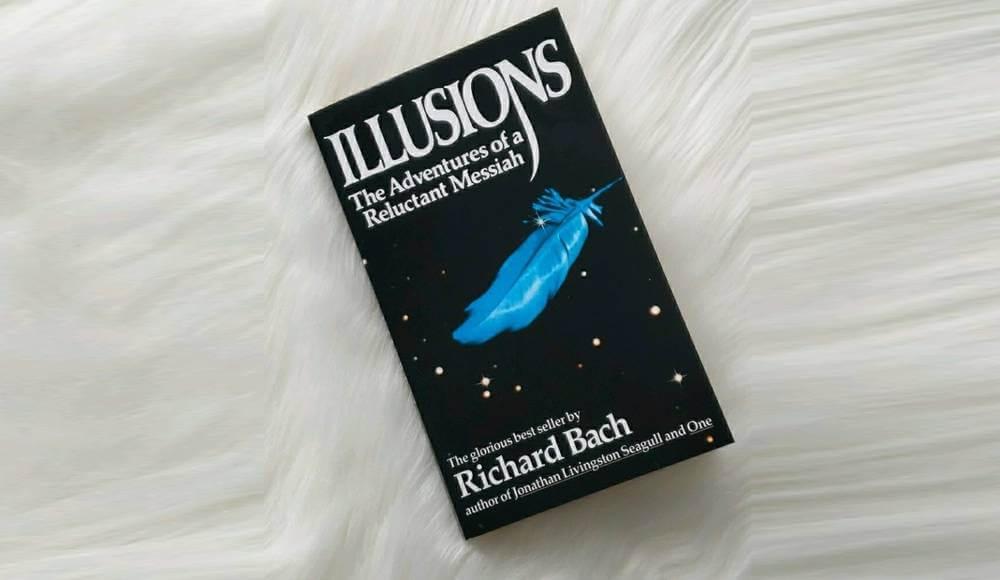Author: Richard Bach
Genre: Fiction, Philosophy, Spiritual
Published: 1977
“Illusions: The Adventures of a Reluctant Messiah” by Richard Bach is a captivating and spiritually uplifting novel that takes readers on a metaphysical journey to explore the nature of reality, belief, and the human experience. First published in 1977, this timeless tale continues to inspire and challenge readers with its thought-provoking narrative and profound insights.
Setting the Stage
The story follows Donald Shimoda, a former aircraft mechanic turned Messiah, and his encounters with Richard, the reluctant writer who becomes his apprentice. The narrative unfolds through Richard’s perspective as he embarks on a journey with Shimoda, exploring the depths of human potential and the illusions that shape our reality.
Exploring the Illusion of Reality
At its core, “Illusions” is a philosophical exploration of the illusions that govern our lives. Bach brilliantly weaves a narrative that challenges conventional thinking and invites readers to question their beliefs. Throughout the story, Shimoda imparts his wisdom to Richard through a series of enlightening conversations and demonstrations of seemingly impossible feats, all of which serve as metaphors for breaking free from the illusions that limit our potential.
The Reluctant Messiah
Donald Shimoda, the enigmatic Messiah, is the heart and soul of the book. His character is a fascinating blend of wisdom, humility, and a touch of irreverence. Shimoda’s reluctance to embrace the traditional role of a Messiah and his desire to live an ordinary life is a central theme that resonates with readers. His teachings challenge the notion of leadership and power, emphasizing that true spiritual guidance comes from within and doesn’t require a hierarchical structure or religious dogma.
Richard: The Reluctant Apprentice
As the reluctant apprentice, Richard represents the reader’s perspective—skeptical, questioning, and yearning for a deeper understanding of life’s mysteries. Through his journey with Shimoda, readers vicariously experience the transformation from doubt to belief, from illusion to enlightenment. Richard’s character serves as a relatable conduit for the reader to explore and absorb the profound lessons imparted by Shimoda.
Metaphysical Teachings
Bach’s novel is filled with metaphysical teachings that challenge our preconceived notions about reality and self. Shimoda’s ability to perform “miracles” like making time stand still or moving objects with his mind challenges the boundaries of what is possible. These metaphysical elements serve as powerful allegories, encouraging readers to transcend the limitations of their own beliefs and tap into their innate potential.
The Power of Belief
A central theme in “Illusions” is the power of belief. Bach explores how our beliefs shape our reality and limit our potential. Shimoda’s teachings emphasize that belief is a choice, and we have the power to change our beliefs to create a new and more fulfilling reality. This concept is particularly empowering, as it encourages readers to take control of their own lives and destinies.
Writing Style and Narrative
Richard Bach’s writing style is simple yet profound. He uses straightforward language to convey complex spiritual and philosophical concepts, making the book accessible to a wide range of readers. The narrative flows smoothly, with each chapter presenting a new lesson or revelation that keeps the reader engaged and eager to discover what comes next.
Timeless Relevance
Despite being published over four decades ago, “Illusions” remains as relevant and impactful as ever. Its exploration of spirituality, self-discovery, and the quest for meaning transcends the boundaries of time and culture. The book’s messages about the importance of questioning societal norms, seeking one’s true purpose, and embracing the power of belief continue to resonate with readers from all walks of life.
Critique and Controversy
While “Illusions” has garnered a devoted following and widespread acclaim, it has also faced criticism. Some readers find the novel’s philosophical and spiritual themes too abstract or esoteric, making it challenging to grasp the deeper meanings. Additionally, the book’s narrative style, which often presents teachings through dialogue and allegory, may not resonate with readers seeking a traditional plot-driven story.
Conclusion
“Illusions: The Adventures of a Reluctant Messiah” by Richard Bach is a profound exploration of the human experience, belief, and the nature of reality. Through the captivating journey of Donald Shimoda and Richard, the novel challenges readers to question their own beliefs, transcend the illusions that hold them back, and embrace their true potential.
Richard Bach’s writing, though simple in style, carries a depth of wisdom that continues to inspire and uplift readers across generations. The novel’s timeless relevance and thought-provoking themes make it a valuable addition to the library of anyone seeking spiritual growth, self-discovery, and a deeper understanding of the human condition.
As we journey through life, “Illusions” reminds us that the power to shape our reality lies within our beliefs, and the path to enlightenment begins with the courage to question the illusions that bind us. In a world often clouded by doubt and uncertainty, this book serves as a beacon of hope and a guide to embracing the extraordinary within the ordinary.
Check out the podcast episode…
Check out the Happiness 2.0 Podcast – https://podcast.edwardgdunn.com/




